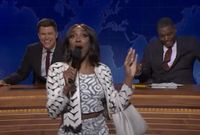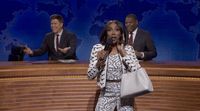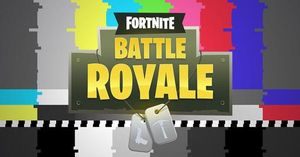In a surprising turn of events, Saturday Night Live (SNL) found itself at the center of a potential FCC violation during the latest episode aired on April 5, 2025. The incident occurred during a call-and-response segment of the popular "Weekend Update" feature, led by cast member Ego Nwodim, who humorously stepped into the role of her alter ego, "Ms. Eggy." This segment was a reaction to the recent decision by the White House Correspondents Association to pull comedian Amber Ruffin from the lineup for the upcoming Correspondents' Dinner.
Nwodim's bit, which showcased her signature comedic style, included a playful jab at the dinner's menu and a humorous lament about her fictional family. However, the routine took an unexpected twist when Nwodim prompted the audience with the line, "These men ain't what?" To the shock of both Nwodim and the NBC censors, a portion of the audience responded with a loud, unfiltered "Shit!" This spontaneous outburst was one of the FCC's seven banned words, and it was caught live on the East Coast feed, although it was muted on later broadcasts and West Coast airings.
As the audience erupted in laughter, co-anchors Colin Jost and Michael Che were visibly taken aback. Jost raised his arms in disbelief while Che leaned back in his chair, both struggling to contain their amusement. Nwodim, ever the quick thinker, ad-libbed, "We’re finna get fined for that!" and added, "Y’all gonna have to pay for that, Lorne’s gonna be mad at y’all." The moment, which seemed entirely improvised, has since become a viral sensation, drawing attention across social media platforms.
Despite the slip, SNL has a history of navigating similar situations. The show has aired live for decades, and while it employs a slight delay on the West Coast to manage such occurrences, the FCC's safe harbor rules allow for fleeting profanity in programming aired after 10 PM. This means that while the curse word was broadcast, it may not necessarily lead to fines, particularly given the context of the live performance.
The incident is reminiscent of a previous slip on SNL, when Scarlett Johansson was heard saying "oh shit" during a Christmas segment, which also went unbleeped due to a West Coast censor oversight. Such moments have become part of the show's unpredictable charm, often leading to memorable reactions and fanfare.
In the wake of the uproar, SNL has not publicly commented on the potential repercussions of the incident, leaving fans and media outlets speculating about possible FCC fines. The show's spokesperson did not respond to requests for comment, adding an air of mystery to the unfolding story.
Amber Ruffin's removal from the Correspondents' Dinner lineup has also sparked discussions about political influence in comedy. Ruffin, known for her sharp wit and critique of the Trump administration, expressed her disappointment on NBC's "Late Night with Seth Meyers," stating, "If they had let me give that speech, ooh baby... I would have been so terrifically mean." Her absence from the event has been met with mixed reactions, highlighting the intersection of politics and entertainment.
As the episode continues to garner views online, with over 60,000 hits on YouTube alone, it serves as a reminder of the unpredictable nature of live television. Fans and critics alike are left to ponder the implications of the incident, both for SNL and for the broader landscape of televised comedy.
The incident has also reignited conversations about the FCC's role in regulating content on public airwaves. The landmark Supreme Court case FCC v. Pacifica Foundation, which arose from comedian George Carlin's famous "seven dirty words" routine, set the precedent for how the government can regulate speech in broadcasting, emphasizing the need for context and timing in determining what is deemed inappropriate.
As for the future of SNL, the show continues to be a platform for comedic commentary on current events, albeit with the ever-present risk of crossing the line. With its legacy of pushing boundaries and challenging norms, the show remains a staple of late-night entertainment, captivating audiences with its blend of humor and social critique.
In the end, the incident serves as a testament to the unpredictable nature of live performances and the delicate balance between humor and regulation. Whether SNL will face any consequences from the FCC remains to be seen, but one thing is certain: the show will continue to thrive on its ability to surprise and entertain.








